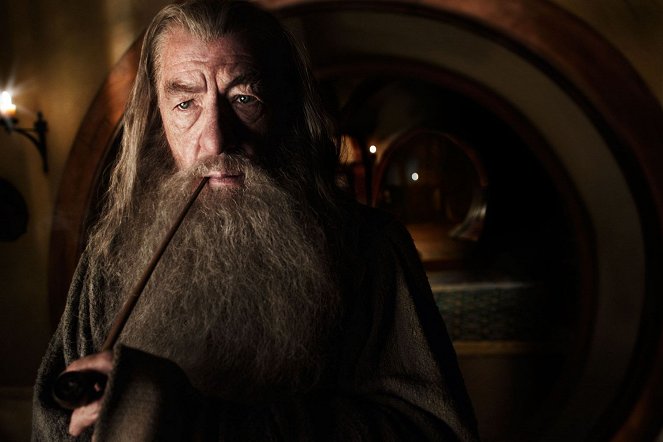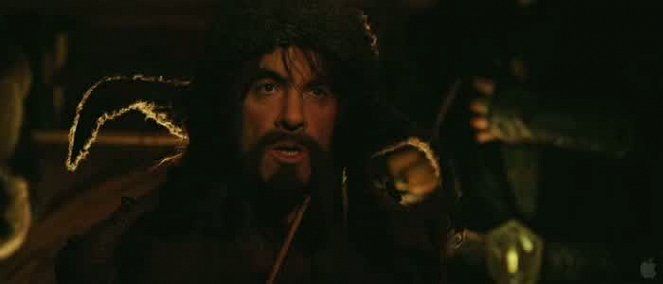Directed by:
Peter JacksonCinematography:
Andrew LesnieComposer:
Howard ShoreCast:
Martin Freeman, Ian McKellen, Richard Armitage, Ken Stott, Graham McTavish, William Kircher, James Nesbitt, Stephen Hunter, Dean O'Gorman, Aidan Turner (more)VOD (4)
Plots(1)
Bilbo Baggins is swept into a quest to reclaim the lost Dwarf Kingdom of Erebor from the fearsome dragon Smaug. Approached out of the blue by the wizard Gandalf the Grey, Bilbo finds himself joining a company of thirteen dwarves led by the legendary warrior, Thorin Oakenshield. Their journey will take them into the Wild; through treacherous lands swarming with Goblins and Orcs, deadly Wargs and Giant Spiders, Shapeshifters and Sorcerers. Although their goal lies to the East and the wastelands of the Lonely Mountain first they must escape the goblin tunnels, where Bilbo meets the creature that will change his life forever... Gollum. Here, alone with Gollum, on the shores of an underground lake, the unassuming Bilbo Baggins not only discovers depths of guile and courage that surprise even him, he also gains possession of Gollum's "precious" ring that holds unexpected and useful qualities... (official distributor synopsis)
(more)Videos (74)
Reviews (18)
With “The Hobbit” is like with the weather. When it’s hot, people complain it’s hot, and when it’s cold, they complain that it’s cold. With “The Lord of the Rings”, audiences grumbled that Jackson left out a lot and adapted it to his own image; with “The Hobbit”, they grumble the opposite, that the adaptation is too literal and consistent in quoting Tolkien's book. People just don't know what they want, you can't please anyone and I laugh at this herd mentality. So....did you find Jackson's King Kong overwrought, but you loved it anyway because you admired its perfect filmmaking craft and imagination? Or on the other hand, is there at least a tiny soul of a child left in you who likes to play and wonder? In that case, you’ll sure love The Hobbit. It's like coming to a long-awaited party among old friends and feeling at ease with them. On top of that, Jackson will overwhelm you with so many audiovisual sensations that you will feel like you’re drinking moonshine. Leave the boredom and negativity to the curmudgeons and to Spáčilová with her worn-out compilation of foreign reviews. And for the rest of you, put on your hats and run to the cinema! Jackson is still on top and the spirit of Middle Earth is still alive.
()
Returning to Middle-earth after so many years is fine. The three hours are still mesmerizing in the perfect WETA world, both in the moments of infantile goofiness (the book itself is a fairy tale) and the ultimate in self-indulgence (the battle of the thundering men of the rocks), yet it all feels somehow... hollow. This is mainly because there is no imaginative moment from a distinctive filmmaker and the only vital moment of the whole film is the puzzle game with Gollum. In the end, I'm actually sorry in retrospect that Guillermo del Toro didn't direct it because Peter Jackson loves this world maybe a little too much. I liked it, and yet I have no reason to ever see it again.
()
When it comes to fantasy, it’s all terribly simple. You just have to create a magical world for the viewer to fall in love with, pick characters that are quirky enough but not too quirky for the viewer to fall in love with, don't mess up the effects, compose masterful music that awakens the little kid in the viewer who longs for adventure every time he hears it, and then just come up with a really, really engaging story. If you can pull this off, even the girl who knew for sure that The Hobbit wasn't going to be for her will still be happy in the end. 4.5 stars.
()
“The World isn’t in your books and maps. It’s out there.” Review of the extended version (I haven’t seen the cinematic release). Though it is presented as an adventure fantasy following in the footsteps of The Lord of the Rings, for me The Hobbit was primarily a story about the transformation of a wayfarer (or nerd) journeying through fictional worlds, who longs mainly for his books, into a real hero. In particular, Bilbo’s lack of capability for epic adventure enlivens and advances the narrative (culinary tips given to giants, escaping from the Goblins). A forgotten handkerchief brings about not only the gradual loss of all creature comforts, but also the protagonist’s transformation from someone who constantly seeks a stronger leader to guide him into a character who acts of his own volition. I believe that this transition toward independence will continue in future instalments. The long introduction in Hobbiton is not important solely for the purpose of outlining the objective of the mission and introducing the dwarves. The depiction of the comfort in which the provincial-minded “no adventure” halfling lives also serves as a contrasting background for the situations in which the protagonist later finds himself. Nostalgia for one’s lost home is a motif that is given greater depth throughout the film, not only through Bilbo, but also through the dwarves living in exile after their exodus. The Hobbit and the dwarves repeatedly overcome their physiognomic preordination, as they have to face enemies much larger than themselves again and again. The gradual intensification of the risks with which the characters are confronted occurs in parallel with a warning of future threats, resulting in The Hobbit becoming a major promise of events that have yet to come. There is no harm in postponing the undiluted spectacle, because the adventure presented to us grows in parallel with Bilbo, who is just getting his bearings in a world of real danger, so he has enough time for riddles with a schizophrenic scoundrel and, like the viewer, must have a lot explained to him. The explanatory passages turn the main storyline into a font of secondary storylines that, however, do not slow down or distract from the primary narrative, as they converge at the initial source and make it clear that their importance will be fully appreciated in the sequel. Only the length of some of the action sequences goes beyond the needs of the narrative, revealing that Jackson, like del Toro, is at heart a gadgeteer with a weakness for bizarre monsters. Furthermore, the raw visual aspect of the action scenes does not fit well with the more lyrical image of the picturesque landscape. Given the multiple screenwriters and the literary and other sources that they drew from, the result is still admirably cohesive and it’s been a long time since I enjoyed such a pure (in genre terms) and (in the good sense of the word) old-fashioned adventure. 85%
()
"Set time" in Middle-earth - I can't think about this film in any other way. A prequel for something that doesn't need a prequel, a film that has a hard time finding its pace, a film that can't shake off the specter of the overly strenuous imitation of the Lord of the Rings trilogy, a film whose characters, despite almost three hours, act like Bilbo, Gandalf, Thorin and a chubby bunch of blabbering beards (moreover, I'm not quite sure if the step of giving Thorin the position of Aragorn was successful). Since The Return of the King, Jackson seems to me to be lost in a pastel-filled imagination - after the third sunset / sunrise, I have no doubt that what was "beautiful and epic" in the original trilogy is more self-serving and kitschy here (this also applies to the depressing flights, which are supposed to confirm to us "that it's here again and it's as big as an orc double chin"). Still, I'm not overly disappointed. Partly because I didn't expect anything else. Particularly because Tolkien's book was not particularly hurt by the powerful thickening of the "additional" storylines, although the best moments for me are equally identical to those of the books (puzzles in the dark, the Song of Durin's People). In some cases it is a mirror reflection of The Fellowship of the Ring (for example composition: the historical "battle" introduction // the exposition in Middle Earth // the diplomatic interlude in Rivendell // the action mess in the depths, but there are more such connections), while in some case it is its opposite (while The Fellowship of the Ring cut and dynamized, the Hobbit rather stretches and retards with retrospectives and explanations). I can't shake the impression that the original trilogy looked "more cinematic" thanks to a smaller share of digital accessories, and thanks to that it also functioned as "good epic theater". The Hobbit did not give me this feeling even during the eloquent speeches in Rivendell. No, I'm definitely not annoyed, but if I was anxiously waiting to see if the division of the film into three parts made much sense, I have no greater reason to say YES after today. The rating applies to the 3D version with dubbing and hovers a "bit" over three stars. But just a little bit. Edit: not even the original version convinced me. For me, the film between the poetic introduction and the action finale contains an awful lot of dramatically staged rubbish, which did not draw me into its depths for even a moment like any (cut out) scene in The Fellowship of the Ring. It is wide, so I'm wondering if all those dialogic retardations and hinted storylines will be beneficial later.
()
Gallery (227)
Photo © New Line Cinema, Metro-Goldwyn-Mayer, Warner Bros. Pictures / James Fisher, Mark Pokorny



Ads